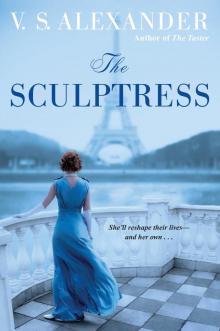- Home
- V. S. Alexander
The Irishman's Daughter Page 27
The Irishman's Daughter Read online
Page 27
They made their way back to the upper deck. The ship’s bell tolled, and the chain grated against the pulley as the anchor lifted from the sea.
“Look, it’s Rory,” she said with joy to Lucinda. Briana waved as she grasped the railing with one hand. He was there, a small figure among those on the wharf. Could he see her? The ship, with its massive wooden deck and towering stack, dwarfed her, adding to the insignificance she felt, particularly when she looked at the foamy Atlantic waves.
A light rain had begun to fall, and Briana pulled the hood of her cloak over her head while Lucinda wrapped up in her English coat.
“We’re leaving everything behind,” her sister said. “I can’t say more, for if I do I might throw myself overboard.” Her body quivered next to Briana.
“Don’t be silly. Who will help me deliver the baby?” she answered, hoping to inject some slight humor into the conversation.
Lucinda didn’t laugh, but tucked her arm through Briana’s as they stared toward land.
The steam whistle blared, and the ship pivoted west in the harbor, the six masts still furled. Rory, the dock, the line of buildings that lined the wharf, the people who had gathered to see their loved ones off, soon dwindled to specks.
Briana leaned against the railing. I hope he survives and that he takes care of Da. I’ll find a job and send money and food. Will I see him again? Will my baby ever know its father?
A swirl of rain chased them below deck, where they found a window that looked toward Westport. As the ship churned away, Rory and the others disappeared as the sullen sky melded with the somber sea.
* * *
Lucinda was cheered by the grand ambiance of the Warton and the English pedigrees of the other passengers, so much so that she had little time for Briana.
Reading a dreary English novel or staring at the horizon through a portal to stave off sea sickness, Briana often sat alone rather than interact with others. Their berth, near the forward saloon, was close to the engine room. The low rumble of the steam engines, which sometimes lulled her to sleep, was never far from her ears.
Weather permitting, she found herself on the upper deck watching the billowing North Atlantic waves, chilly even in August. The brisk air helped her motion sickness, while the endless surging ridges fascinated her. They appeared in every color of the rainbow: foam green, steel blue, iridescent red and pink at sunrise and sunset. Thoughts about her unborn child often came to mind in those times.
Briana envied her sister, who treated the voyage like an extended garden party, flitting here and there to invitations of luncheon and supper, cards, or gossip while she sat sequestered in the private ladies’ sitting room. Guilt often engulfed her. Why should she dine in opulent luxury when those at home were starving? Her dismal mood, combined with her developing pregnancy, made her too tired and cranky to make conversation with people who didn’t understand how desperate circumstances were in Ireland. She ate many suppers alone in the cabin. Besides, she had few dresses she felt comfortable wearing to the dining room.
“You must climb out of your shell and join me in socializing,” Lucinda scolded her one evening seven days into the voyage. “Two sets of ears are better than one. I expect your help in finding the best place for us to live, since we know so little about Boston.” According to the crew, the ship was nearing the western edge of the North Atlantic, south of Greenland, with at least another six days to go before arriving in America.
That night they dined with two English ladies from Liverpool who seemed to look down upon both of them despite Lucinda’s previous experience as a governess to a wealthy Manchester family. They reminded Briana of the English guests who had visited Lear House, but on the whole not as cordial or sincere. The ladies were destined for a winter stay with “a sister” in Salem, Massachusetts.
“What will you do when you arrive?” one of the women sniffed as she absentmindedly flicked at the white egret feather in her hat.
Before Briana could answer, Lucinda piped up, “Oh, we have people waiting for us.”
“Yes, scads,” Briana replied, giving her sister a sly look.
Lucinda puffed up in her chair. “I shall teach and my sister shall . . .”
“Shall what, dear one?” Briana asked.
After another pause, Lucinda said, “Why, do what you do best.”
The ladies wiggled uncomfortably in their seats, one of them giving Briana a snobbish look. Then they hurried off, their starched gowns rustling against the floor.
“Why didn’t you play along,” Lucinda whispered crossly after the women had gone.
Briana scoffed. “They have no interest in us. They couldn’t care less what we do.” She gazed around the opulent room with its white and gold columns, pilasters of painted oriental flowers and birds, and walls of blue and gold. A few diners still remained in their seats finishing small desserts or sipping tea. “Look at them!” The passengers were mostly well-to-do English men and their wives, along with a few Irish who had enough money for or had managed to scrape together passage. “They have no idea what we’ve gone through. I feel positively embarrassed to be sitting here at a table loaded with food when Rory, Father, and Jarlath have no idea where their next meal is coming from.”
Lucinda pursed her lips, controlling her ire. She fumed underneath the best silk dress she could haul to America while her eyes spat darts. “That attitude won’t get us far in Boston. Those ladies have a point. We’ve discussed what we might do, but we must develop relationships. I can teach, and I suppose you can clean houses until you deliver the baby, but we’ll have better luck if we get recommendations.”
“We’ll do what every Irish immigrant has done before, I suppose,” Briana replied, but she had no idea what that might be. Everything was new, even the experience of traveling by steamship. Nothing in her life had prepared her for what might happen once they set foot on foreign soil.
Lucinda pushed back her chair and closed her eyes in frustration. When she opened them she said with a sharp tongue, “This ship is carrying mail from England. Perhaps we can work for the post when we get there.”
Briana ignored her sister’s jab as the ship lurched over the waves and her stomach rose and dropped. A cold sweat broke out on her forehead, and she excused herself from the table. Seeking a breath of fresh air before bed, she climbed the two flights of iron stairs from the dining saloon to the deck. She teetered across the slick wood, grabbing at whatever she could to steady herself. A crewman cautioned her not to go to the railing, but she insisted and he accompanied her.
Billows of clouds, which seemed to touch the ship’s masts, concealed the stars. No rain fell, but the rushing wind brought a pleasant odor she had experienced only a few times in her life, always in late summer or early fall along the coast she knew so well. The warm, moist air brought to mind tales she had heard of the tropics and its exotic blooms, of strange plants and animals that lived in a world ruled by rain and heat. The smell permeated the ocean air like floral perfume.
Below, the ebony breakers crashed against the iron hull. She could just make out the white roil against the ship as it crested with each oncoming wave. The vessel lurched wildly a few times, and the sailor pointed to the stairs leading below deck. It was time to go back to her berth; no one else had foolishly ventured into the evening air.
* * *
The Warton creaked and moaned through the night, rocking and sometimes shuddering sideways as if it might be wrenched in half. Briana sat up clutching the berth’s railing with one hand and her stomach with the other. She fought off waves of nausea as her sister slept above her. Lucinda’s voyages to England had apparently prepared her for the ship’s violent motions.
By noon the next day, the seas had calmed to a gentle roll. Briana was shocked to see the rain-slickened upper deck covered in seaweed and even the stinking bodies of a few fish when she ventured up after luncheon. She stepped around the detritus, sat upon the doors of an elevated cargo hold, and wrapped the neckline of her c
loak around her throat.
“May I help you, miss?”
The man’s deep voice startled her. Briana turned to find a tall officer in uniform. His dress-blue cap was positioned on his head, as if it was unassailable in the stiff wind.
“I’m sorry,” the older man said. “I didn’t mean to alarm you, but few passengers venture out in weather like this.” A smile beamed across his weathered face. His lean body and sturdy sea legs attested to a man who loved his job and the open ocean.
He extended his hand. “Captain William Hawthorne,” he said in a formal but pleasant English accent.
She shook his hand and answered in English. “Briana Caulfield. Thank you for your concern, but I’m fine. I find that the ocean air and views of the horizon help my sea sickness. It reminds me of the cliffs at home.”
“Ahh,” he said as if he realized she was someone who appreciated the ocean swells. He gripped his hands behind his back, planted his feet firmly on deck, and rocked with the mild motion of the ship, his knees flexing with each wave. “A true lover of the sea. It’s rare to find one in the fairer sex. I admire your fondness for its beauty.” He pointed to the vast, unbroken ocean past the bow. “Last night was rough going, but we should be beyond the effects of the gale in a few hours. After that the winds will shift, and with sails up, we should make excellent time. Where are you headed—Boston or New York?”
“Boston.”
“I see. I detect from your accent that you’re Irish.”
“County Mayo,” she replied. “I don’t suppose you know Carrowteige?”
“No, but I’m familiar with the northwest Irish coast and the hazards it presents to any mariner.” He unclasped his hands and put a finger on his lips. “A legend exists there about children turned into swans—am I correct?”
Briana was amazed that the Captain would know anything about the Children of Lear. “I come from Lear House. It’s owned by Sir Thomas Blakely of Manchester.”
“Blakely . . . Blakely . . . the family name sounds familiar. Perhaps he’s sailed aboard this ship.”
She wanted to go no further in a discussion about the landlord or what the topic might lead to. “How soon until we dock in Boston?”
He cocked his head. “Five days if we’re lucky, more likely six.” His features tightened, and any hint of delight on his face was erased. “We have nothing to worry about, but I’ve received recent reports that Boston has turned away ships.”
Briana pivoted toward him. “What?”
“The Customs House at Long Wharf has turned away ships with Irish passengers who carry disease. Fortunately, the Warton is not in that category—at least no one that we know of is sick—but passengers and immigrants may be held for processing. You can never tell what the Americans might do, but I can’t say that I blame them. Would you let typhus carriers into your country?”
“If the ship was turned away, what would we do?” she asked, cringing inwardly at the thought.
“We’d find another place to dock—Salem has always been a friendly port. I know the harbormaster there.” He stiffened with determination. “Never fear. We’ll get through.” He looked toward the bow. “You must excuse me. Duty calls. If we don’t meet again, enjoy the rest of the voyage.” He glanced at her with a stern, fatherly smile. “Be careful on the deck. We don’t like accidents.”
Briana nodded and gazed at the Captain’s tall, elegant figure as he strode toward the bow. Her mind shifted uneasily to the new life that she and Lucinda would have to make for themselves. What if they couldn’t dock in Boston? Briana had no idea where Salem was or how they would manage there.
* * *
Captain Hawthorne was right in his prediction. The Warton had passed the storm in the Mid-Atlantic and was now sailing in a southerly direction on favorable seas. Briana welcomed the spits of land, the strips of rocky, wooded coastline that slipped by on the northern horizon.
On their last day at sea, Briana returned to the cabin to find Lucinda tossing clothing out of her bag. “What in God’s name are you doing?” she asked her.
Lucinda turned and then tumbled onto Briana’s berth with a horrified gaze. “The letter and the forty-five pounds Rory gave me—I can’t find them!”
Briana’s heart fluttered. Rory had given them to Lucinda for safekeeping. It was all they had to pay for rent, food, and clothing. She jumped in to help her sister, rummaging through Lucinda’s bag and searching every dark corner of the cabin.
“Think,” Briana said, fearing they would have nothing after the search failed. “Where could it be?”
“Oh, God, I don’t know,” her sister replied. “I thought it was in my bag.”
“We need that money!”
“You don’t need to remind me!” Sighing, Lucinda sank down on the lower berth and cradled her head in her hands.
On the upper berth, Briana spotted the novel Lucinda was reading. She lifted the book by its cover and shook it. The pages spread out from the spine like a fan. The money and the folded letter dropped from their hiding place in the center of the book.
Lucinda clutched them to her breast. “Thank God,” she said with a sigh of relief. “I don’t remember using my book as a hiding place.”
“A good idea,” Briana said, examining the book’s cover. “Hardly anyone, except you, would want to read this.”
“Hush. Be grateful we have it.”
They hoped they had enough money to get past the Customs Service, if necessary, but the letter was another matter. Her father had written it explaining his daughters’ need to leave County Mayo because of the famine and the effect it had on the family. Both were to act as companions and aides to each other, according to the testament. If the letter had been lost, a strict Customs official might deny them entry into the country. Her father made no mention of the baby, thinking it might cause Customs to believe that Briana was coming to America only to have a child—to increase the Irish population.
That evening at dinner, they sat by themselves contemplating what their new lives would be like. Lucinda was exceptionally quiet through their meal as if something was troubling her. Briana found herself picking at her food, although she knew she should eat well this last night aboard ship.
“They didn’t welcome us, did they?” Lucinda asked as they neared the end of the meal.
“Who?”
“These English prigs.”
Briana couldn’t believe her ears. “What did you say?”
Lucinda smirked and swept her fork around the dining room. “These fine ladies and gentlemen from England. It was Sir Thomas who invited me into his inner circle . . . but only for the good it did him as one who could deliver an Irish governess to his friends’ children. He never thought of me.
“What will happen to us?” Lucinda continued, her face tightening as if it might crack open from vulnerability. Briana had seen her sister lose her steely resolve more than once since she had returned to Ireland. Before the famine, such emotional displays were rare.
Briana reached across the table and grasped her sister’s hand. “We’ll live in a boarding house until we find a home. I wish Father and Rory—even Father O’Kirwin—had known someone in Boston. Perhaps that would have made things easier for us.”
Lucinda stuck her fork into a piece of chocolate cake. “Many times I dreamed of earning enough money, getting out of Ireland, taking the whole family with me. Wouldn’t it be grand not to worry about money? Like—” She lifted a piece of cake, then put it down, and gazed at the white tablecloth.
“He was a fantasy, dear sister. One you need to forget. Sir Thomas wouldn’t save us if he could.” The repugnant thought crossed her mind that she might have saved her family if she had been willing to abandon Rory and sacrifice herself to the landlord. The idea made her skin crawl.
Lucinda lifted her head and cocked an eyebrow. “We’ll see.”
Briana did not share her sister’s ill-founded optimism and gave up trying to convince her to forget Sir Thomas. They finis
hed dessert and then left the dining saloon. Lucinda retired to the cabin, while Briana took one last look on deck.
The sky was clear and filled with brilliant stars that added to the warmth washing over her in soothing waves. The south wind caressed her as she looked west toward the horizon. Far away, isolated points of light twinkled amid the forests, and campfires burned orange where the land met the sea.
Taking her gaze away from the distant shore and looking at the calm sea ahead, she imagined Boston’s harbor opening to the Warton. Thousands of people who lived in a city bigger than she had ever seen were only a night’s sail away. She clutched the railing as feelings of excitement and apprehension raced through her.
* * *
She and Lucinda hurried to the deck after breakfast to watch the ship sail into port. Land as far as they could see ran in both directions from the harbor banks. Hazy, wooded hills loomed beyond a city lanced with church spires and with smokestacks that spewed pearly ash.
Under a luminous blue sky, she stood by her sister as the ship glided past the harbor islands. The sun warmed her so much that she had to fan herself with her hand. America was already different, and she hadn’t even set foot on it. The harbor air smelled of sewage and dead fish, unlike the pure Atlantic breezes that buffeted the Irish coast. Past the harbor, rows of brick buildings, many taller than she had ever seen, cut into the air. She got the sense that traffic coursed through the city’s vibrant streets, alive with people and horses, goods and money exchanged as businesses began a new day.
The Warton headed for a central wharf that extended far into the harbor. People the size of insects crowded the docks in ever-shifting patterns, like ants scavenging for food. She spotted a crewman waiting near the rail. “Is this Boston?”
He nodded. “Yes, ma’am . . . we’re docking at Long Wharf.”
She smiled and clutched her sister’s arm. The ship had not been turned away. They would be docking after all!
Her excitement grew as she and Lucinda took one last look at their cabin, gathered their bags, and offered a few quick good-byes to the crew. They joined the hundreds of travelers eager to leave the ship as they congregated near the gangplank exit. The Warton sailed past the eastern end of the wharf, where wagons, crates, bundles, and baskets crowded the stone landing. The ship edged to the left. A group of sailors uncoiled thick ropes at the wooden pilings that rose up from the harbor perpendicular to the wharf.

 The Irishman's Daughter
The Irishman's Daughter The Sculptress
The Sculptress The Taster
The Taster Her Hidden Life
Her Hidden Life The Magdalen Girls
The Magdalen Girls